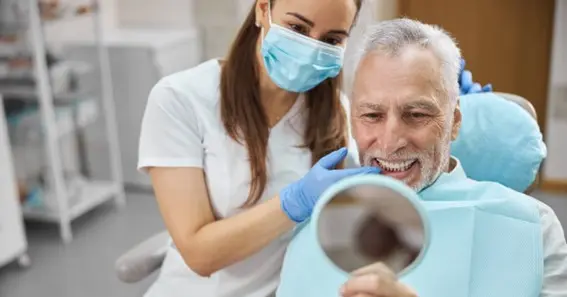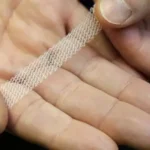Our goal is to highlight the subtle early signs of oral cancer, understand where seniors fit into the risk levels, and talk over some straightforward prevention tips. We want our seniors around as long as possible with happy, healthy smiles!
So, join us on this insightful journey where we’ll explore how to pay attention to symptoms. and making proactive care a priority can make a huge difference in protecting seniors’ oral health as part of the aging process. Let’s work together to keep those smiles looking vibrant and healthy for years to come!
Recognizing the Signs of Oral Cancer in Seniors
Subtle symptoms that might indicate oral cancer are easy for seniors to miss. Mouth sores that won’t heal, unexplained bleeding in the mouth, white or red patches appearing inside the cheeks or gums, and odd lumps or growths could signal early trouble. Conducting regular self-checks each month helps raise awareness.
About 53,000 new cases of oral cancer happen annually nationwide – so being vigilant about symptoms matters a lot. The risk goes up as we age, doubling for adults over 55. The key is that catching signs early makes a huge difference in survival odds – 80-90% when detected early versus a later stage. Knowing what quiet clues to watch for empowers seniors to seek dental exams sooner when something seems off.
Dentists also play a vital role in spotting potential lesions or abnormalities during standard check-ups that patients may overlook. They check all mouth and throat tissues for suspicious changes every six months.
Regular check-ups with professional primary care physicians, who are trained to identify early signs of oral cancer, play a crucial role in early detection. Studies show a clear link between staying on top of regular dental visits and better oral cancer outcomes.
Biannual exams help with earlier detection and rapid treatment if any concerns pop up. Any worrying symptoms should prompt making an appointment sooner between standard cleanings, too. Don’t delay reaching out—the odds are better when oral cancer gets addressed early!
- White, red, or speckled patches in the mouth
- Mouth sores lasting 2+ weeks
- Strange growths, lumps, or thickened areas
- Changes in existing moles
- Difficulty swallowing, speaking, or moving the jaw
- Numbness or pain in mouth or face
- Unexplained loose teeth
- Unexplained weight loss
Also Read N: The Critical Connection between NNMT Peptide Dosage and Physical Well-being
The Role of Dentists in Early Detection
Studies confirm a strong correlation between regular dental check-ups and improved survival and mortality rates for oral cancer. This is because dentists have the clinical eye, training, and tools to spot early abnormalities that patients likely would miss on their own. They identify cancer sooner, when survival odds are highest.
Ensuring biannual dental visits every 6 months allows for expert screening and early cancer detection if necessary. And if any worrying symptoms arise in between standard checkups, rapidly consulting a dentist for assessment rather than waiting remains pivotal. The sooner cancer is identified, the better the prognosis.
By leveraging dentists’ expertise through routine, comprehensive oral exams, seniors can maximize their chances of finding cancer early when it is most treatable – boosting survival odds immensely.
Also Read P: The Science of Relaxation: How Swimming Pools Boost Mental Well-being
Risk Factors and Contributing Lifestyle Choices
Seniors who smoke cigarettes or drink heavily face a substantially higher oral cancer risk. The combination proves especially dangerous – those who smoke and drink excessively bear a 15 times greater risk. Quitting smoking and moderating alcohol intake drastically reduce the chances of developing oral cancer.
Rates of HPV-linked oral cancer are also rising exponentially among older adults, increasing by 225% in the past 20 years. The HPV vaccine protects against strains that cause oral cancer, along with cervical, vaginal, penile, and other cancers. Seniors ought to consult their doctor about vaccination if they have not been immunized.
Furthermore, maintaining a balanced diet rich in cancer-fighting fruits and vegetables promotes overall health. The antioxidants, vitamins, minerals, and compounds found naturally in plant foods possess anti-cancer effects. Regular exercise also strongly correlates with lower oral cancer rates. Living actively and eating healthy foods daily helps mitigate risk substantially.
Using broad-spectrum lip balm with SPF 30 or higher can also thwart cancer of the lips. Lip cancer constitutes 5-10% of all oral cancer cases. Lips lack melanin, the pigment that helps skin withstand sun damage. Generously applying SPF lip balm before sun exposure protects this delicate tissue.
Prevention Tips and Screening Frequency:
Cultivating a lifestyle that deters oral cancer is critical for seniors seeking to reduce risk. Daily habits like abstaining from tobacco, limiting alcohol intake, eating ample fruits and vegetables, using broad-spectrum SPF lip balm, and maintaining good oral hygiene all help thwart oral cancer from taking root or progressing. Remaining proactive proves vital.
Oral cancer can sneak in stealthily, often asymptomatic early on or presenting with subtle symptoms. Thus, seniors must regularly self-check their oral health in addition to seeing dentists. Any abnormalities noticed should prompt a dental visit. But how often should seniors schedule oral cancer screenings specifically?
Expert medical groups advise biannual dental exams to facilitate oral cancer checks. Those facing higher risk due to lifestyle factors may warrant screening more than twice a year. Routine professional checks for early detection significantly boost survival rates.
Oral cancer caught in stage 1 yields an 80–90% five-year survival rate, compared to only about 20% when found in stage 4. Preventative screening remains the best technique for early detection and optimal outcomes.
In addition to professional oral exams, seniors can take charge of their health through monthly self-checks using a flashlight and mirror. Feel along the cheeks, gums, and all mucosal tissues for abnormalities. Repeating this oral scan monthly enhances early detection between dental visits.
Any odd spots or suspicious symptoms noticed should prompt a rapid consultation with your dentist or doctor. Combining vigilant self-monitoring with professional exams constitutes the most proactive prevention.
FAQs
Can oral cancer develop without pain? Are there silent symptoms?
Yes, in its early stages, oral cancer can be asymptomatic. Some subtle signs include changes in the voice, numbness or tenderness in the mouth, trouble swallowing, and unexplained weight loss. Staying vigilant about one’s oral health is vital.
How often should seniors get oral cancer screenings?
Biannual dental exams allow dentists to screen for oral cancer. Those with elevated risk may need more frequent testing. Preventative screening is the best way to detect cancer early.
Can seniors take measures to prevent oral cancer?
Yes. Preventative steps include: abstaining from tobacco, moderate alcohol consumption, HPV vaccination, using lip balm with SPF, eating a plant-rich diet, and maintaining good oral hygiene. Being proactive lowers risk.
Conclusion
The bottom line is that when more seniors tune into subtle symptoms, understand their risk factors, and take preventive – we can drive down oral cancer rates in the older population. This comes down to simple stuff we can all tackle:
- Doing monthly self-checks at home for odd changes between 6-month dental exams
- Mitigating lifestyle choices that increase risk – tobacco use, heavy alcohol use and sun exposure
- Making those biannual professional screenings a top priority
- And optimizing daily oral hygiene habits
Remaining vigilant about possible signs, plus being proactive with check-ups and healthy lifestyle choices – that’s our best defense against tricky oral cancer. Arm yourself with the knowledge in this article – it could literally save your life or the life of someone you care about.






